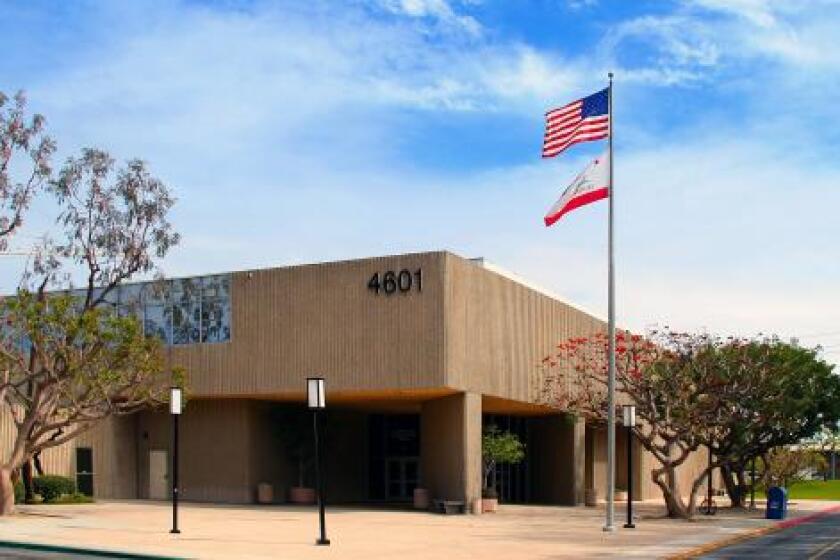More than chocolate eggs
- Share via
Michele Marr
Chocolate bunnies and pastel Peeps, jellybeans and egg dyes have all
been on store shelves for weeks now in anticipation of Easter.
But for those who celebrate the Christian holiday, it’s a holy
season that has little to do with Easter bonnets, baskets or bunnies.
Many Christians -- especially Roman Catholic and Orthodox
Christians, but also many Protestants -- anticipate Easter with Lent,
a long penitential season of self-examination, confession and
fasting.
Some Christians don’t eat sugar and sweets during Lent. Many
abstain from other foods like meat, diary products, alcoholic
beverages and olive oil. It’s not a time to party.
Christians sometimes keep an even stricter fast during Holy Week,
the week between Palm Sunday, which is the Sunday before Easter, and
Easter Day.
“During Holy Week we are called to enter into the life, death and
resurrection of Jesus,” said Sister Maureen Sheehan, BVM, director of
liturgy at Sts. Simon and Jude Roman Catholic Church. “We begin on
Palm Sunday with Jesus’ triumphant entry into Jerusalem.”
Palm Sunday is the last Sunday in Lent and the beginning of Holy
Week. Palms branches are blessed for a procession that represents
Jesus’ entry into Jerusalem, when crowds greeted him with palms, a
symbol of victory, the week before his resurrection.
During the Palm Sunday service a Gospel account of the passion, or
suffering, of Jesus is traditionally read.
The Thursday before Easter is known as Maundy Thursday, named from
the Latin mandatum novum, which means “new commandment.”
Maundy Thursday remembers the night of Jesus’ last supper with his
disciples, when he instituted the Eucharist, washed their feet and
instructed them, “A new commandment I give to you, that you love one
another; as I have loved you, that you also love one another.” In
some churches the Eucharist is know as the Lord’s Supper, or Holy
Communion.
Some congregations symbolically reenact Jesus’ washing his
disciples’ feet on Maundy Thursday. In the Roman Catholic Church and
some other liturgical churches, there is a Mass in the evening, and
the Eucharistic Host is consecrated for the next day then placed in a
special chapel of repose. The altars of the church are stripped bare
and remain bare until the Easter Vigil, held on the Saturday night
before Easter Day.
“Good Friday is the day that we specifically remember the day
Jesus died on the Cross,” Sheehan said, “We pray for the needs of the
world, we venerate the Cross, we listen to the Passion of Jesus from
the Gospel of John.”
Many Christians throughout the world participate in processions
that reenact Jesus’ path from the judgment hall of Pilate, where his
death was ordered, to the site of the crucifixion on Mount Calvary.
This year, St. Wilfrid of York Episcopal Church has organized an
ecumenical Good Friday Procession of the Cross, on a route in
Huntington Beach, which will start at the Pier Plaza amphitheater and
end at the church on Chapel Lane.
“We hope anybody who is a Christian, or not, but who has an
interest in what Good Friday is about, or maybe just curiosity, will
come and join in with us,” said the Rev. Harold Clinehens, Jr.,
rector of St. Wilfrid. “We are simply wanting to bear witness in a
public way to a major liturgical day in life of the Christian church,
a public procession reenacted the Passion [of Jesus].”
Participants can park at the church a half hour before the event
and carpool to Pier Plaza. During the walk, a special Stations of the
Cross will be provided for children at the church, as well as nursery
care for very young children.
Those who need child care are asked to call the church in advance
and also to bring a bag lunch for their children. Walkers should
bring a bottle of water to drink during the three-mile walk. Cold
drinks will be served at St. Wilfrid after the walk.
Some of the procession participants will carry a life-size wooden
cross during segments of the procession and there will be stops along
the way for reading the Passion Gospel of John and for prayer.
“The Passion Gospel will be broken into sections and then read by
two members of our congregation, both of whom are actors,” Clinehens
said. “They read the Gospel in such a moving and engaging way that
people are just riveted.”
Good Friday is followed on Saturday by the Easter Vigil.
“This is the important celebration of the church year,” said
Sheehan. “We begin outside with the lighting of the new candle, the
Light of Christ, [then] we listen to a series of reading from the Old
Testament that gives us the history of salvation beginning with the
story of creation. We baptize adults who have been in a long period
of preparation and we celebrate the Easter Eucharist.
“Easter Sunday is a glorious celebration that is an extension of
the Easter Vigil.”
* MICHELE MARR is a freelance writer from Huntington Beach. She
can be reached at [email protected].
All the latest on Orange County from Orange County.
Get our free TimesOC newsletter.
You may occasionally receive promotional content from the Daily Pilot.



